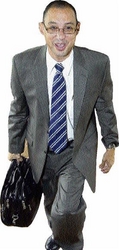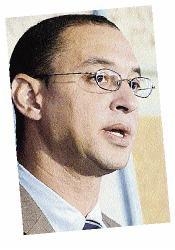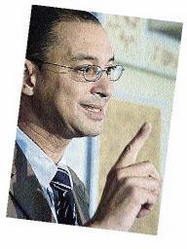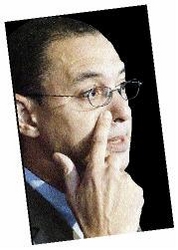Don Wehby - Dreaming of a better Jamaica, working for a brighter future
Published: Tuesday | September 15, 2009

Don Wehby
A 1962 Ford Cortina being asked to drive at 120 miles per hour in 60 seconds. Near impossible, isn't it?
Well, that's Don Wehby's analogy of the first observation he made when he entered the Ministry of Finance and the Public Service two years ago.
His playful daughter Abigail, who was five at the time, had bounced so much on a bed, Wehby was sprung into answering the call from Prime Minister Bruce Golding to join his team. However, nothing had prepared him for the slow pace at which information moves in the public service.
The date was September 13, ten days after the Jamaica Labour Party (JLP) ended the 18 1/2 reign of the People's National Party (PNP) following the general election of 2007. "I got a call from Prime Minister Golding, saying he needs support in the area of finance. I didn't know him very well and I was not a member of the labour party or anything, so it was really a big surprise to me. My initial reaction was to say no. But I said "let me think about it and get back to you"," recalled the GraceKennedy executive.
Then the Abigail magic struck. "She was jumping on the bed and we started playing. Then I said to myself that if I can make a difference, I should. I want my children to grow up in Jamaica," Wehby told The Gleaner in an interview. "That was the magic moment of me saying yes. I remember calling Mr Golding and saying, 'I am going to do it'; and he said, 'that is the best news I have heard for a long time'."
Having taken the oath of office and charged up like a stick of dynamite, Wehby went to work and quickly realised that the information communication technology in the public sector was outdated.
"Things that I took for granted in the private sector in terms of analysis of information in variance analysis and what-if scenarios using technology was just not there," said the former minister of government. "You have the staff in the Ministry of Finance working very long hours. The people work so hard, they try their best, they are very loyal but the tools they have to work with are so antiquated; it is really unfair."
Making a change
The accountant had given up his job as an executive at GraceKennedy and headed to the public sector to make a change. He said he did not want to be a man on his veranda just complaining. Having said yes, he had entered a new world and little would have prepared him for his new job as a minister without portfolio in the Ministry of Finance and the Public Service. "One of the things that was new to me was to work very hard and get negative comments from the public. That was new to me because I am not a politician but it was good for me. It made me much stronger as a person," said Wehby. "I can tell you that it is so easy to criticise when you are on the outside looking in but when you are the person actually given that responsibility, it is a totally different exercise."
Prime Minister Golding had picked Wehby to partner Dwight Nelson and Audley Shaw in the finance ministry. His antecedents at GraceKennedy meant that he was well placed to help in Budget preparation, divestment issues and other complex fiscal matters. But the extent of the reality of the country's books caught him off guard. The realities were grim.
Recalled Wehby: "The first Budget that was done ... the first number I remember writing it down was 54 cents. That 54 cents out of every dollar would go to debt servicing. After writing down, you have Andrew Holness coming in to see you about his requests for education, you had Derrick Smith, at the time, coming in about crime; Ruddy (Spencer) coming in about health - that is the practical example of saying you can't afford it; there is no money there. These guys had some good plans but there was no money there. That is when it really hit home that we were in a crisis."
This crisis, the former minister said, was a seed planted by governments of the past which dug the country into debt and was unwittingly nurtured by a reluctance to take tough political decisions. "If we think about it, Jamaica has been in a crisis for a very, very long time and it is an accumulation of avoiding making those tough decisions because of the fear of losing political support," noted the 45-year-old father of three. "Some of the issues that I saw when I sat down in office (as a minister of government) are issues that should have been dealt with a little while ago but they were going to be very politically unpopular."
Making things worse
Jamaica's debt has climbed to $1.2 trillion. It was a shade below the trillion-dollar mark when the JLP took over from the PNP. The country's debt to GDP ratio is approximately 120 per cent which puts Jamaica in the top five of the world's worse debtors. Wehby argued that the insatiable appetite to borrow money, coupled with low production, has made improving the country's fiscal conditions difficult. Political ballgame, he said, has not helped.
"The struggle of any political party is to strike the balance between political power while administering the right medicine to ensure that Jamaica can return to growth on a sustainable basis," he argued, adding: "The debt is really the end result of what is happening. The only way to solve your debt problem is to ensure that you balance the Budget as quickly as possible. Every time you produce a deficit, you have the appetite for borrowing. When you have an appetite for borrowing, interest rates are going to go up, there is going to be a loss of confidence in the market and that is going to have pressure on your rate of exchange.
"What has been happening for the last 20 years - I call it the treadmill effect - you are producing a deficit because you are spending more than you are earning. To cover that deficit, you have to go to the market and borrow, so there is a demand for funds, you crowd out private capital, interest rates go up, there is a confidence factor; low productivity and then you have a foreign-exchange gap. You have to grow the economy. To achieve the reduction in the debt, the Jamaican economy has to undergo major reforms. The status quo cannot remain the same."



Greatest contributions
One aspect of this reform, Wehby contends, must be in the area of taxation. In fact, the highly rated businessman noted that he has left a framework for a massive tax reform which he listed among his greatest contributions to the public sector over the last 24 months. "There is a comprehensive document, which I am hoping, in terms of discussion and debate on tax in Jamaica, will replace the Matalon Report (on tax reform). It is called 'A Blueprint for Tax Reform'... I think that if the document is followed, it is going to make a big difference."
The document of which Wehby speaks was developed after consultations and close examination with experts, including Pricewaterhouse partner Brian Denning, Dr Damien King, Colin Steele, Keith Collister and technical persons from the Ministry of Finance and the Public Service. While he did not speak to the contents of the blueprint for tax reform, Wehby has his own idea of how Jamaica's tax system should be structured.
"...The tax system is very inequitable and is very complicated. We need to simplify the tax system. I believe we need to move the tax system from a more direct taxation to a more indirect taxation," he said, adding: "There is good argument to remove all items that are exempt and put them to standard rate and it even shows that we could reduce the GCT rate if we do that. The problem is that a lot of the items that are now zero-rated or exempt are basic foods and other items for the less fortunate in our society. What we need to do is to have some of those increased funds from the GCT collection routed into a social safety fund so it can ease the burden to the poor. I am hoping that the Government continues to look at that model to see the impact on society."
"There is significant room for improvement in the tax revenue," Wehby argued. Government's figures show that apart from PAYE taxpayers, only about 4,000 Jamaicans are paying taxes. It shows that 80 per cent of company taxes and 50 per cent of property taxes are not being paid or collected. One per cent of registered companies account for 75 per cent of corporate taxes! Also, a recent survey found that out of 500 doctors, only 100 were paying taxes or recognised on the tax list.
Legislative turnaround
Wehby also had time while in government to look at some state entities. He highlighted the need to properly manage public-sector bodies, divest others and reduce government bureaucracy. He also believes that there is a need to improve the time for legislative turnaround.
"We need significant economic reform. We need a transformation of our economy. Behind the easy saying of balancing the Budget, the tough decisions are going to have to be there," Wehby argued.
He pointed, for example, at the interest cost on the Budget which is 15.9 per cent of GDP. "That is the highest in the world. That is something that we have to get on top of. It must come down or else its going to choke everybody," he declared.
But the former minister is not just wishing that the economic reform happens. He told The Gleaner that in his two years he has contributed much to the process which, if allowed to bear fruit, will help to lead to a better Jamaica. He emphasised: "There is a lot of work in the pipeline which, if carried through to fruition, is going to make a big difference. I am happy to have been part of it."

















